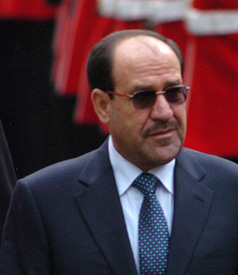Baghdad – As Iraqi politicians put the final touches on a long-awaited new government, a U.S.-sponsored proposal to curb the powers of Prime Minister Nouri al Maliki is still struggling to take shape.
The plan aims to create a national strategic council to guide policy decisions. But after months of haggling, Iraqi lawmakers remain divided over how much power the council should have, who should sit on it and what it should be called.
Establishing a council also would require amending Iraq’s constitution, and although lawmakers were scheduled to discuss draft legislation in a session over the weekend, it didn’t come up for debate.
With Maliki expected to announce at least a partial cabinet as early as Monday, including members of all of Iraq’s major political blocs, experts say the council risks becoming an afterthought — illustrating the limits of the United States’ ability to influence politics in Iraq as it prepares to withdraw its remaining 50,000 troops by December 2011.
Lawmakers said that the council wouldn’t be created before the Dec. 25 deadline for government formation, and experts say that the political and constitutional maneuvering required to establish it could drag on for weeks or months afterward.
Meanwhile, the main proponent of the council, the secular Iraqiyya political bloc, has said it would join Maliki’s government, and over the weekend its members jockeyed for the 10 cabinet posts that the bloc has been assigned. On Saturday, lawmakers removed a key obstacle to Iraqiyya’s participation by reinstating three members who’d been banned for alleged ties to Saddam Hussein’s Baath party.
The head of Iraqiyya and the man expected to lead the council, Iyad Allawi, could still refuse to participate. Allawi’s supporters have argued that the council should have decision-making power in key areas such as national security and energy policy, while Maliki’s people have insisted that it will have only an advisory role.
Experts said that if Allawi, a secular Shiite, boycotted the government, it was unclear if his mostly Sunni bloc would follow him.
“Iraqiyya seem eager to participate in the next government even though almost all of their initial demands were rejected,” said Reidar Visser, a veteran Iraq analyst and author of “A Responsible End? The U.S. and the Iraqi Transition.”
Visser said that the prospect of controlling government ministries, with all the patronage opportunities that entails, was too irresistible for Iraqiyya members to pass up. The result, he said, is that Maliki’s government could appear broad-based but without the explicit checks on his power that U.S. officials had envisioned.
“U.S. ideas for power-sharing will have been conveniently left aside, which is not surprising given that they were unfeasible in the first place due to the need for special legislation to be passed in order to make them work,” Visser said.
When U.S. officials in Baghdad first told Qassim Daoud, an independent Shiite politician and former national security adviser, of the council idea, he said to them, “This is a joke.”
“If we want to accommodate a politician we have to arrange for him a new institute?” Daoud said in an interview. “This is unconstitutional.”
Before the council idea, the Obama administration pushed for Allawi to be named president with expanded powers. That was rejected by backers of the current president, Kurdish leader Jalal Talabani — and also widely viewed as unconstitutional.
U.S. officials have said that Allawi’s participation in the government is necessary because he led Iraqiyya to a narrow plurality over Maliki’s Shiite-dominated coalition in the parliamentary elections in March, although he failed to win enough support from rivals to form a governing coalition. As a Shiite leading a mostly Sunni party, Allawi is also seen as a symbol of secularism in a political system dominated by Shiites.
However, if the government features Sunnis in prominent posts — Iraqiyya member Osama Nujaifi has already been elected parliamentary speaker — the importance of Allawi and the council could diminish.
“The council was created as a way around the political impasse,” said Michael Wahid Hanna, an Iraq expert at The Century Foundation, a New York-based think tank.
“If you get a deal that gets … a broad based national unity government and Iraqiyya were incorporated in a substantial sense, you get to the same place,” Hanna said. “The council is a tool, not a desired end in and of itself.”
The current proposal calls for the council to include the prime minister, president, parliamentary speaker and all their deputies, with representatives of all the major political blocs. If 80 percent of the council supports a decision, Maliki would be bound to follow it; less than that and the opinion would serve merely as a recommendation.
“It will take care of all strategies, security, reconciliation,” said Maysoun al Damlouji, an Iraqiyya lawmaker. “It will be in charge of a wide spectrum of Iraqi public life.”
Given Iraq’s highly factionalized politics — no party won more than Iraqiyya’s 28 percent of parliamentary seats — 80 percent seems a nearly impossible threshold and one that’s unlikely to challenge Maliki’s decision-making authority.
“Take my word,” Saleh al Mutlaq, a Sunni politician who was among those reinstated by parliament over the weekend, said in an interview before his reinstatement. “He (Maliki) will never let this council happen in the plan it was designed.”
We have 9 days to raise $50,000 — we’re counting on your support!
For those who care about justice, liberation and even the very survival of our species, we must remember our power to take action.
We won’t pretend it’s the only thing you can or should do, but one small step is to pitch in to support Truthout — as one of the last remaining truly independent, nonprofit, reader-funded news platforms, your gift will help keep the facts flowing freely.
